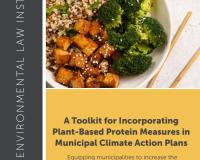
Vibrant Environment
All | Biodiversity | Climate Change and Sustainability | Environmental Justice | Governance and Rule of Law | Land Use and Natural Resources | Oceans and Coasts | Pollution Control

Wetlands are critical ecosystems that provide important benefits for people and wildlife. They provide flood protection, resilient infrastructure, carbon storage, increased water quality, and are integral to the culture and economy of local communities. The urgency of preserving these important resources is only heightened by the reality of climate change.


Communities living near chemical plants—on the “fenceline” in policy parlance—cannot continue to be exposed to cancer causing toxic emissions.

How we communicate about our environment matters just as much as what we communicate if we want our message to be heard. ELI Press’ new book, Mud Lake, reaches out to a broad audience, from middle schoolers to senior citizens, by incorporating illustrations and universal adventure stories of how kids engaged with natural areas during the 1960s. The book is filled with narrations about sights, sounds, feelings, and smells that spark fond memories for anyone who may have experienced similar landscapes during their youth.

Cities have an outsized carbon footprint and are on the frontlines of adapting to climate change impacts. Rising to the challenge, many cities have developed climate action plans (CAP) that include measures that can be taken to achieve targeted greenhouse gas (GHG) emissions reductions.

With violent conflict on the rise around the world, the contexts in which international institutions—including the World Bank, United Nations Development Program (UNDP), Food and Agriculture Organization (FAO), and the Global Environmental Facility (GEF)—support environmental and development interventions are increasingly characterized by fragility, conflict, and violence (FCV).

The Arctic is warming twice as fast as the rest of the world, resulting in devastating climate and environmental disruption. According to the Third National Climate Assessment, the Artic is experiencing earlier spring snowmelt, reduced sea ice, widespread glacier retreat, warmer permafrost, drier landscapes, and more intense wildfires, rendering parts of the region uninhabitable.

World Water Day is an annual event celebrated on March 22nd, dedicated to raising awareness about the importance of freshwater and advocating for the sustainable management of water resources worldwide. In the face of escalating water crises and environmental degradation, the call for innovative solutions to ensure sustainable water management has never been more urgent.

ELI recently created the Food Waste Prevention Resource Guide Series for Urban Green Lab, a Nashville-based sustainability NGO, in order to build the capacity of classrooms, households, and workplaces to prevent food waste.

The Endangered Species Act (ESA) was enacted on December 23, 1973, with the goal of protecting species vulnerable to extinction and conserving the ecosystems and habitats necessary for their survival. The ESA mandates that the federal government maintain a list of all “endangered” and “threatened” species and develop and implement recovery plans, with the objective of removing species from the list.